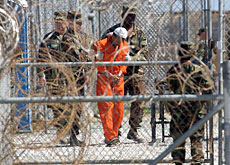
Questions still raised over Guantanamo

It has been five years since the first terror suspects arrived at the United States' controversial detention centre in Guanatamo Bay, Cuba.
Since last summer detainees have been accorded prisoner of war status as set out in the Geneva Conventions, but Swiss human rights groups are still calling for the base to be closed.
“Guantanamo is a symbol of disregard for basic human rights,” said Daniel Bolomey, general secretary of the Swiss branch of Amnesty International.
People are being arrested and held at the centre without being given the right to a trial before a competent court, he said, and are subject to cruel and inhumane treatment.
For Bolomey, the Guantanamo camp is part of a wider “galaxy” that includes the former US military prison at Abu Ghraib in Iraq and the Bagram base in Afghanistan.
Ahead of the 5th anniversary on January 11, Amnesty International has launched a campaign to close down Guantanamo Bay.
Bolomey criticises the fact that very little is known about who is being detained and the circumstances of their detention. He wants governments to demand explanations over alleged “unacceptable practices” at the Cuban base.
Closure
However, Bolomey is convinced that although the centre is still running, human rights organisations have made some impact. Calls for its closure are mounting, he says, and have been backed up by human rights experts at the United Nations.
Swiss Foreign Minister Micheline Calmy-Rey has also on several occasions raised concerns over Guantanamo Bay.
Dick Marty, the Swiss senator who investigated illegal CIA prisons in Europe, said in a newspaper interview that Guantanamo symbolised the failures of the Bush administration.
He said closing the base was still a goal, but the question was where to house the detainees afterwards. There was also the risk of lawsuits against the US government.
But the US government has always defended the camp and says inmates are treated humanely. Of the first 1,000 detainees who arrived in Guantanamo in 2002, more than 400 remain at the base.
The US set up the camp to hold foreign terror suspects captured during the Afghanistan conflict. Others are said to have been arrested in Pakistan or other countries. Prisoners’ nationalities include Russian, French and British.
The detainees were classified as “enemy combatants”, meaning they did not have the same rights as prisoners of war and could be held without charge and trial during the duration of the hostilities.
Military tribunals
However, the Bush administration’s plans to try suspects by military tribunal were dealt a blow in July 2006 when the US Supreme Court ruled the Bush administration did not have the authority to do so.
This led to the US government announcing that all detainees in US military custody around the world would be entitled to protection under Common Article 3 of the Geneva Conventions of 1949.
The article prohibits violence against detainees, including cruel treatment and torture, and “outrages upon personal dignity” including humiliating and degrading treatment. It also outlaws sentencing or executing prisoners without a fair trial.
But some observers say protection is not afforded to people who have been held in secret CIA prisons.

More
Geneva Conventions
Uncertainty
According to Vincent Lusser, spokesman for the Swiss-run International Committee of the Red Cross (ICRC), which has been allowed access to detainees at Guantanamo Bay, the US’s recognition of Article 3 of the Geneva Conventions, is a positive development.
But the future for many prisoners is still unknown, he said.
“They are still in a state of uncertainty concerning their legal status and for many this has lasted five years,” added Lusser.
He reckons this also affects around 600 detainees held at the US’s Bagram base in Afghanistan.
For relatives the situation can be very stressful. “There needs to be a verdict,” said Lusser, adding that the ICRC was in talks with the US over the issue.
Meanwhile allegations of abuse at Guantanamo continue to surface. In an internal report revealed on January 3, FBI agents said they had seen at least two dozen cases of possible mistreatment of detainees.
swissinfo with agencies
The US has been holding people whom it suspects of involvement in terrorism at a detention centre in Guantanamo Bay since 2002.
More than 400 detainees are said to be held there coming from more than 30 countries.
The Swiss government and the ICRC have raised concerns about human rights at the camp.
January 11, 2002: The first prisoners taken from Afghanistan to Guantanamo.
July 15, 2005: Switzerland calls on US to keep to the Geneva Conventions.
February 16, 2006: 5 UN human rights experts call for Guantanamo to be closed.
June 29, 2006: US Supreme Court rules Bush administration does not have authority to hold military tribunals.
July 12, 2006: US government recognises Geneva Conventions.
January 3, 2007: FBI agents report finds cases of possible mistreatment Guantanamo.

In compliance with the JTI standards
More: SWI swissinfo.ch certified by the Journalism Trust Initiative






























You can find an overview of ongoing debates with our journalists here . Please join us!
If you want to start a conversation about a topic raised in this article or want to report factual errors, email us at english@swissinfo.ch.